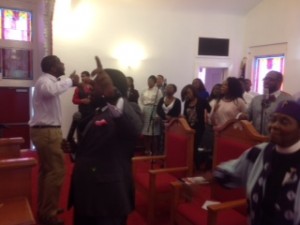Who has time to haze?

Edward Waters College (EWC) recognized National Hazing Prevention Week (September 23 – September 27) during its September chapel service. The service was hosted by Delta Psi Chapter of Kappa Alpha Psi Fraternity, Inc. under the supervision of Rev. Dr. D. Lovett Sconiers, Chaplain and Religion Professor at EWC. The keynote speaker for the service was Dr. Ronald W. Holmes who asked the critical question, “Who has time to haze? The following is an excerpt of the speech:
Considering the national graduation rate for college students over a six-year period is 55 percent, who has time to haze? Considering the unemployment rate is 8.9 percent for college graduates with bachelor degrees, 22.9 percent for high school graduates and 31.5 percent for high school dropouts, who has time to haze? Considering that violence is rampant in our national and international communities such as Washington, Chicago and Kenya, who has time to haze?
Yet, hazing is an epidemic in the American culture. It occurs not only in educational institutions (K – 20), but also in the military, sports and the workforce. Hazing is defined as any activity expected of someone to join a group that has the potential to humiliate, degrade, abuse or endanger a person regardless of his or her willingness to participate in the activity.
Students, you are not a snitch when you report hazing incidents to campus officials. However, it is your bad or my bad (as we say) when you harm someone psychologically and physically. Remember the famous Road Runner cartoon, where the coyote’s goal was to catch the Road Runner and destroy him. The message in the cartoon was, “Road Runner, the coyote is after you. Road Runner if he catches you, you are through.” The only problem was that the Road Runner persistently demonstrated that he was not going to be caught and harmed by his perpetrator. And you must have the same mentality that you are not going to be hazed or caught by your coyote (the hazer), lose sight of your destination and fail to get a quality education. You must stand your ground against your perpetrator.
Laws alone cannot eradicate hazing from our campuses. You must consciously decide not to haze or to be hazed. Currently, there are 44 anti-hazing laws adopted in almost every state, including Florida. However, there were three hazing deaths in 2011, including Robert D. Champion Jr. at Florida A&M University and four hazing deaths in 2012 including one at the public school level.
Sparked by the tragic death of Champion, one of EWC’s Trustee members, Reverend Dr. R.B. Holmes Jr., launched the National Anti-Hazing Anti-Violence Task Force to provide community support to educational institutions through the implementation of anti-hazing prevention strategies. As a part of this initiative, Trustee Holmes asked that I write the book, “How to Eradicate Hazing” to discuss anti-hazing prevention strategies and other researched-based solutions to promote the eradication of hazing from our educational institutions.
With all proceeds of the book going towards scholarships for the Robert Champion Foundation, Inc., the book has two purposes: (1) encourage educational institutions to understand the meaning of hazing from a historical, psychological, sociological, theological, legal and cultural perspective and (2) employ a nine-step plan that addresses the issue of hazing on educational campuses.
Based on the nine- step plan, students and other stakeholders of educational institutions must clearly know what the policies, procedures and laws pertaining to hazing. This information must be transparent regardless of whether students are participating in extra-curricular activities such as band, football, sororities, fraternities, etc.
Anti-hazing preventions information must be an essential part of the Student Code of Conduct, membership intake, pledge or any extra-curricular activity in the academic setting. Along with the faculty sponsor reviewing the policies, procedures and laws with their respective activity, it is recommended that educational institutions create anti-hazing training, implement a campus 24-hour anonymous hazing hotline and teach acceptable initiation rites such as community service projects and mentoring programs.
It is also recommended that educational institutions conduct anti-hazing rallies; integrate discussion about hazing into the curriculum by having students write about the topic in subjects such as English and History, have student organizations review the institution policies with their membership, develop a writing, rapping or debating contest where students deal with the topic of hazing and convene student organizations to talk about what hazing is and its impact on students, organizations and families.
With Hazing being accepted as a “rite of passage” into certain groups and organizations, CNN recently asked viewers to respond to the question, “Is any type of hazing acceptable?” As a misconception, members of groups feel it is okay to haze other members because of tradition. However, we have to educate all groups, students and administrators nationwide that it is never appropriate to haze in any way, shape or form. Hazing demonstrates a lack of compassion for others and themselves.
Similarly, a local radio station in Georgia asked its audience, “Does joining a group bring a person closer to its members?” Misinformed students believe hazing improves socialization in a group. However, we have to redirect all groups and students’ understanding that hazing promotes social oppression in groups by exerting power and control over those who are victimized or perceived as less powerful in the groups.
Furthermore, hazing contradicts the biblical principles of bringing up a child in the way he should go and when he is old he will not depart from it. In fact, hazing is causing many students from the elementary to the postsecondary level to depart from their upbringing despite it being a crime. We can no longer sit idly by and allow students at our educational institutions to be humiliated, degraded, abused or endangered in groups willingly or unwillingly without proactive strategies, policies and procedures to counter demeaning, disruptive and deadly acts of hazing.
We know sticks and stones may break our bones and words shall never harm us. Hazing is breaking our students’ bones physically and harming them psychologically throughout the country. We must overcome this epidemic of hazing. If Alvin Brown can become mayor of Jacksonville, we can overcome. If Barrack Obama can become president of the United States, we can overcome. If Nelson Mandela can serve 27 years in prison and still become president of South Africa, we can overcome.
Rev. Dr. Martin Luther King, Jr. once said, “the ultimate measure of a man is not where he stands in moments of comfort and convenience, but where he stands at times of challenge and controversy.” Hazing is a serious challenge and controversy for our nation to tackle! We must recognize and report hazing when we see it. If we are uncertain about its characteristics, we should apply the duck test. In other words, if something looks like a duck, swims like a duck and sounds like a duck, then it probably is a duck.
So during the National Hazing Prevention Week and year round, members and representatives of Edward Waters College, let’s join forces to promote the eradication of hazing through activities mentioned today and other researched-based strategies and best practices at Edward Waters College and other educational institutions across the nation.
Change begins with each of us. Students, that means you need to say “no!” Say “no” to being victimized by hazing and avoid participating in hazing activities. It means, find alternative ways to build camaraderie and kinship in sports, clubs and other extra-curricular activities. Faculty and staff, this means, continue to enforcing the policies, procedures and laws and maintain a zero tolerance policy regarding hazing. And finally, remember, parents are not sending their precious children to these sacred halls of learning to be hazed. Parents’ expectation is that we will enhance students’ knowledge, skills and attitudes to be productive citizens, mentally, emotionally, educationally and spiritually.
Dr. Ronald Holmes is the author of four books, “Education Questions to be Answered,” “Current Issues and Answers in Education,” “How to Eradicate Hazing and “Professional Career Paths.” He is publisher of “The Holmes Education Post,” an education focused Internet newspaper. Holmes is a former teacher, school administrator and district superintendent. He can be reached at [email protected].




